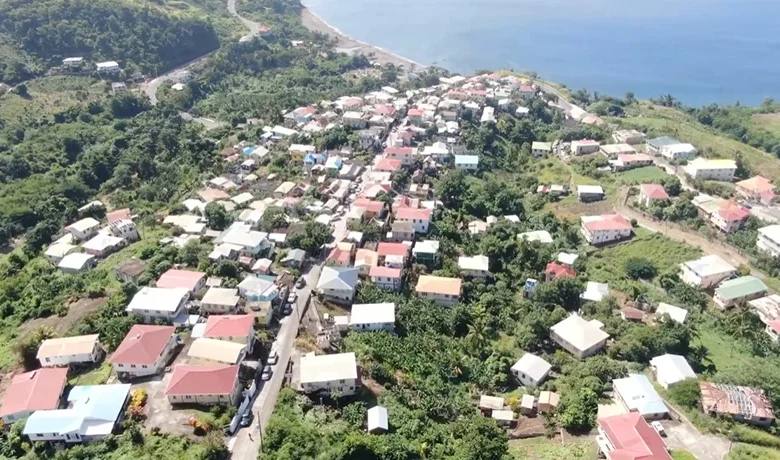Barroui

Barroui, also known as Salisbury, is a coastal village on the west coast of Dominica. Located at approximately 15°26′9″N latitude and 61°26′13″W longitude, it falls within the Saint Joseph Parish. The village is approximately 50 meters (160 feet) above sea level and has a population of around 2,590.
Historical Background
The name “Barroui” is derived from the indigenous people of Dominica, the Kalinago, and reflects the island’s rich cultural heritage. During the early 20th century, Barroui was a small village characterized by thatched-roof huts along the shoreline, with the local Catholic Church, constructed in 1929, being a significant landmark. In the 1950s and 1960s, the banana industry began to use the town as a port where bananas could be transferred from feeder roads into the island’s interior to “banana boats” exporting the nation’s produce.
The village’s name, Barroui (pronounced “bah-wee”), reflects its rich cultural heritage. During the 20th century, the name Salisbury became equally accepted, influenced by English colonization and the increasing Anglicization of the nation. In the early 1900s, Barroui was a modest settlement with thatched-roof huts along the shore and a significant landmark—the local Catholic Church, constructed in 1929.
The 1950s and 1960s marked a transformative period for Barroui, driven by the burgeoning banana industry. The village became a pivotal port where bananas were transferred from feeder roads into the island’s interior to “banana boats” exporting the nation’s produce. This development spurred the community’s growth, particularly toward the north, as private land became available for sale.
A landmark event in Barroui’s history occurred on August 29, 1976, when Dominican Premier Patrick Roland John introduced the idea of independence to the nation. He signed the Salisbury Declaration in the village, signalling Dominica’s intent to become an independent state.
Community and Culture
Barroui reflects a vibrant community spirit and cultural heritage deeply rooted in its history. The village is supported by various facilities that serve its residents and uphold its social and cultural framework:
- The Salisbury Primary School provides foundational education for the village’s children, fostering academic growth and community involvement.
- The Salisbury Health Centre offers basic medical care and health education, ensuring the well-being of residents.
- The Salisbury Police Station ensures law enforcement and safety, contributing to the village’s secure environment.
- The Salisbury Catholic Church is a spiritual centre integral to community gatherings, hosting events like weddings, baptisms, and religious festivals.
- The West Coast Co-operative Credit Union Ltd provides financial services to residents, supporting local businesses and personal financial management.
- The Salisbury Playing Field is a hub for sports and recreation maintained by the Salisbury Sports Committee. It hosts football matches, athletic events, and cultural activities.
- The Salisbury Village Council manages local affairs, infrastructure maintenance, and community projects, playing a vital role in the village’s development.
These essential facilities and institutions ensure that Barroui thrives as a community-oriented village, where conservation, culture, and development work together to preserve its unique identity and foster progress.
Natural Features and Environment
Barroui is nestled between lush hills and the Caribbean Sea, offering a picturesque landscape. The surrounding area is characterized by fertile soils, supporting diverse flora such as tropical fruit trees and hardwood species. The nearby forests are home to various fauna, including the Sisserou parrot (Amazona imperialis), an endangered species endemic to Dominica.
The village’s coastal location provides access to pristine beaches and marine environments, making it a favorable spot for fishing and water-based activities. The proximity to the Morne Diablotin National Park, which encompasses the island’s highest peak, offers opportunities for hiking and bird-watching, particularly for those interested in Dominica’s unique avian species.
Infrastructure and Services
Barroui is accessible via the Edward Oliver LeBlanc Highway, the primary road connecting major communities along Dominica’s west coast. The village has seen infrastructural improvements, including paved roads and utility services such as electricity and potable water. The Local primary school meet educational needs, while healthcare services are available in nearby villages like St. Joseph.
The community remains a significant contributor to agricultural development on the island, with many residents engaged in farming and related activities. Local markets and small businesses support the village’s economy, providing goods and services to residents and visitors alike.
Notable Personalities
Barroui has produced several notable figures contributing to Dominica’s political landscape. The first elected parliamentary representative from the community was Bryson Louis, who won the 1975 general election on a Labour Party ticket. Subsequent representatives include Dennison John (1980), James Royer (1985), Earl Williams (1990), and the current parliamentary representative, Hector John.
These individuals have played roles in shaping the village’s development and the broader national policies of Dominica.




